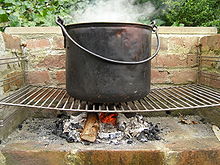오리지날 영어속담에는 이 문구가 "The pot's calling the kettle black."(솥이 주전자보고 검다고 비난한다.)로 표현되기도 하지요.
(야외에서 장작 불을 지펴 검게 그을은 솥의 모습/ 자료출처:Wikipedia)
이런 표현도 있답니다.
"People who lives in glass houses should not throw stone."(유리로 만든 집에 사는 사람이라면 결코 돌을 던져선 안된다.)
마가렛 미첼(Margaret Mitchell)이 썼고 영화로 더 유명해진 "바람과 함께 사라지다."(Gone with the wind)에 보면 "The pot's calling the kettle black."(시커먹게 그을은 솥이 주전자보고 검다고 한다니까.)란 문구가 등장하네요.
성경(The Bible)마태복음(Gospel of Matthew) 7.3절에 보면 예수님께서 하신 산상설교(the Sermon on the Mount) 말씀 중에 아주 유명한 표현이 전해 옵니다.
"Why do you look at the speck of sawdust in your brother's eye and pay no attention to the plank in your own eye?"
(어찌하여 네 눈에 있는 들보/나무판자는 못 보면서 네 형제의 눈에 있는 티끌/작은 티끌/톱밥만 보느냐?)
그렇습니다. 남을 비난하거나 비판하기 전에 자기자신의 허물에 대하여 먼저 객관적으로 살펴 보아야 합니다.
부족 한 부분은 서로 감싸고 보완해서 Win-Win해야겠지요.
사람마다 호불호도 있고 싫어하는 사람 좋아하는 사람있고 천차만별인 것이 인간세상 아니겠습니까?
어느 한 사람 개인취향에 맞추어 억지춘향 식으로 일을 진행하다 보면 힘이 분산되고 조직은 오합지졸, 붕당으로 빠져든다고 생각합니다.
조직과의 조화 그리고 화합을 해치는 사람이 있다면 지위고하를 막론하고 "읍참마속"해야 합니다.
국가이익을 위해서라면 심지어 사형수라도 비밀리에 활용하는 것이 "총성 없는 전쟁"에서 이길 수 있는 비책이기도 합니다.
사회적으로 덕망이 높고 만인으로부터 존경받는 그런 분이 지적하고 비판하고 반대한다면 수용할 수 있는 여지가 많겠지만 반대의 경우라면 최악의 시나리오가 만들어지는 거지요.
우리의 치명적인 내부 문제점이기도 합니다.
국제무대에서 한국을 잘 파악하고 있는 리더 중 한 분이 우리 조직 문제점의 유일한 아킬레스 건이라고 지적한 점도 바로 이 속담내용과 일맥상통 합니다.
장점만 취해서 함께 나갈 때 우리는 Synergy효과라고 부르고 "될성 부른 조직의 힘"이라고 지칭하지요.
단점 없는 사람 어디 있습니까?
우리속담 한 귀절이 떠오릅니다. "The dung-stained dog reproaches the chaff-stained dog."
국가대사, 국가 아젠다를 바로 코 앞에 두고 국가적으로 이러한 불합리와 비효율과 억지논리를 제어하고 재정비하지 않는다면 배가 어디로 갈지 아찔합니다.
"나무아미타불 관세음보살~"
Similar idioms in other languages(여러 나라에서 쓰이는 유사한 표현 모음)
- Arabic: الجمل لا يرى عوجة رقبته ("The camel cannot see the crookedness of its own neck"), الشبكة تعير المنخل
- Azeri: Kor kora kor deməsə bağrı çartlayar. ("If a blind man doesn't point out the other blind man that he's blind, he'll die")
- Basque: Xoxoak beleari: Ipurbeltz!. "The blackbird to the crow: Black tail!"
- Bulgarian: Присмял се хърбел на щърбел! ("The starving are laughing at the toothless!")
- Burmese: "The Son is one month older than the father"
- Hindi: Ulta Chor Kotwal ko daante ("The thief [accused] yells at the police instead!")
- Indonesian: Maling teriak rampok ("The thief shouting robber")
- Czech: Konvice nazývá kotlík černým. ("The pot called the kettle black") Hrnec hrnci káže, oba černí jako saze – Čelakovský[4] ("Pot preaches to pot, both as black as soot.")
- Chinese: 五十步笑百步- ("[Those who have retreated] 50 steps laugh at [those who retreated] 100 steps.")
- Chinese: 雞看不見雞背脊- ("A chicken can't see its own back.")
- Chinese: 烏鴉笑豬黑,自己不覺得-Sichuan idiom ("The crow mocks the blackness of the pig, ignoring its own [blackness]")
- Danish: Man skal ikke kaste med sten hvis man selv bor i et glashus ("You shouldn't throw rocks if you live in a house of glass")
- Dutch: De pot verwijt de ketel dat hij zwart ziet ("The pot reproaches the kettle for looking black")
- Estonian: Pada sõimab katelt, ühed mustad mõlemad ("The pot reproaches the kettle – but they are both black")
- Finnish: Pata kattilaa soimaa – musta kylki kummallakin ("The pot reproaches the kettle – black [is] the side of each")[5]
- French: C'est l'hôpital qui se moque de la charité ("The hospital that laughs at charity"), La pelle se moque du fourgon ("The shovel mocks the poker")[6]
- German: Du sollst zuerst vor der eigenen Tür kehren ("Sweep first in front of your own door")
- German: Ein Esel schimpft den anderen Langohr ("One donkey calls the other one longears")
- German: Sich an die eigene Nase fassen ("To touch one's own nose first")
- German: Wer im Glashaus sitzt, soll nicht mit Steinen werfen ("Who sits in the glass house, shouldn't throw stones")
- Greek: Ipe o gaidaros ton petino kefala ("The donkey said to the rooster "Your head is too big"")
- Hebrew: כל הפוסל במומו פוסל Kol HaPosail, B'mumo Posail ("All who disqualify [another due to a fault] with their own [having that] fault [so] disqualify")[7]
- Hungarian: Bagoly mondja verébnek, hogy nagy a feje or the short form Bagoly mondja verébnek ("The owl says the sparrow has a large head")
- Irish: Sin an túlán ag tabhairt tóin dubh ar an phota! ("That is the pot calling the kettle black!")
- Italian: Il bue che dà del cornuto all'asino ("The ox calling the donkey horned"), Cencio che dice mal di straccio ("A rag speaking ill of a cloth")
- Japanese: "目糞鼻糞" from "目糞が鼻糞を笑う ("Eye wax and snot" shortened from "Eye wax laughing at the snot"), Sanabo.com
- Korean: "똥 묻은 개가 겨 묻은 개 나무란다" ("The dung-stained dog reproaches the chaff-stained dog."), Naver.com or "겨 묻은 개가 똥 묻은 개를 흉본다" ("The chaff-stained dog disparages the dung-stained dog."), Naver.com
- Lithuanian: "Juokiasi puodas, kad katilas juodas" ("The pot laughing at a black kettle"), Patarles.lt
- Norwegian: Å kaste sten i glasshus ("To throw stones in a glass houses")[8]
- Persian: دیگ به دیگ میگه روت سیاه ("The pot tells the other pot your face is black"), Tebyan.net
- Polish: Przyganiał kocioł garnkowi, a sam smoli ("The cauldron was reprimanding the pot and it soots itself"),[9] often contracted to Przyganiał kocioł garnkowi ("The cauldron was reprimanding the pot")
- Punjabi: ਆਪ ਕਿਸੇ ਜਹੀ ਨਾ, ਨਕ ਚੜਾਨੋ ਰਹੀ ਨਾ ("You are yourself good for nothing, and still trying to ridicule others")[citation needed]
- Portuguese: Olha pra teu nariz ("Look at your nose," implying they also have dirt on their nose.),
- Portuguese: O sujo falando do mal lavado ("The dirty is talking about the half clean"),[10]
- Portuguese: O porco falando do toucinho (The pig talking about the bacon),[11]
- Portuguese: Quem tem telhados de vidro não atira pedras (People with glass roofs don't throw stones) and "Diz o roto ao nu" ("The one with shabby/torn clothes says to the naked man)
- Romanian: Râde ciob de oală spartă ("Potsherd laughs at the cracked pot")
- Russian: В чужом глазу соломину видеть, в своём—бревна не замечать ("To see a little straw in other's eye, and not to notice a log in his own"; this is Matthew 7:3); Russian: Чья бы корова мычала, а твоя бы молчала! ("Maybe others' cows could moo, but not yours!", "Look who's talking!")
- Serbian: Rugala se šerpa loncu, a i ona garava ("The casserole laughs at the pot, and they are both sooty")
- Slovak: Trafena hus zagagala. (The goose that is hit is the one to honk.)
- Slovene: Najprej moraš počistiti pred svojim pragom. (Clean before your own doorstep first.)
- Swedish: Kasta inte sten i glashus ("Don't throw stones in glass houses"), Sopa rent framför din egen dörr [först] ("Sweep [first] clean in front of your own door")
- Spanish: Apártate que me tiznas, dijo la sartén al cazo ("Move away, you are blackening me, said the pan to the pot") El burro hablando de orejas ("The donkey talking about ears")
- México: El comál le dijo a la olla ("The grill said to the pot")
- Venezuela: Cachicamo diciéndole a morrocoy conchúo ("An armadillo telling a turtle it is too hard shelled")
- Colombia: El que tiene rabo de paja, que no se arrime a la candela ("if you have a tail made of straw, you'd better stay away from the fire").
- Argentina: El muerto se ríe del degollado ("The dead guy laughs at the one with the throat slit")
- Puerto Rico: El burro hablando de orejas ("The donkey talking about ears")
- Thai: ว่าแต่เขา อิเหนาเป็นเอง (wâa dtàe kăo ì-năo bpen eng) ("[Enau] accuses others, but he himself is guilty") Thai-language.com, look up อิเหนา
- Turkish: "Tencere dibin kara, seninki benden kara". ((One pot saying to another) "Pot, your bottom is black." – (other pot replying back) "Yours is blacker than mine!")
- Urdu: الٹا چور کوتوال کو ڈانٹے ("The thief scolding the magistrate in reverse")
- Vietnamese: Chó chê mèo lắm lông ("Dog ridicules cat for being hairy")
- Welsh: Sbia adra ("Look at home")
'말씀과 마음씀' 카테고리의 다른 글
| 놀라워라! 우리마음 쓰다듬어 주시는 하나님 말씀(스페인어~영어~우리말) (0) | 2011.08.07 |
|---|---|
| 주기도문, 스페인어/불어/영어/한국어로? (0) | 2011.08.07 |
| "믿음, 소망, 사랑"="Faith, Hope and Charity",(자선/사랑=예수님)=(자비/사랑=부처님)<일상다반사> (0) | 2011.04.27 |
| "믿음, 소망, 사랑"="Faith, Hope and Charity",(자선/사랑=예수님)=(자비/사랑=부처님) (3) | 2011.04.27 |
| 주기도문(The Lord's Prayer), 영어와 불어 그리고 스페인어로도~~ (0) | 2011.04.19 |

